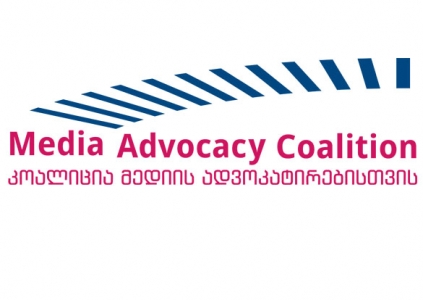


On June 13, 2019, the chairman of the Parliament of Georgia and the Georgian National Communications Commission disseminated information on making of amendments to the Law of Georgia on Broadcasting to regulate the hate speech until July 1, 2019. The obligation of Georgia on the implementation of the Audiovisual Media Service Directive is indicated as the basis for these amendments.
The Media Advocacy Coalition believes that the draft law is aimed at limitation of freedom of expression and contains major threats. According to the amendments proposed by the Georgian National Communications Commission, issues related to the self-regulation of media are transferred to the competence of state regulation and it is possible to appeal the decisions of the media self-regulation body to the Georgian National Communications Commission or court. This creates the risks of arbitrary, unjustified restriction of freedom of expression. The restriction of freedom of expression practiced by the European Court of Human Rights is admissible only by a narrowly targeted law. If the amendments are shared, the Georgian National Communications Commission will be able to interfere in the content of media, which actually means to transmit of leverage of influence on the media to the state. According to the proposed amendments, just the article on the grounds of which Imedi TV broadcasting was suspended on November 7, 2007, returns to regulation.
It is noteworthy that the regulation of hate speech is not the subject of only self-regulation. If there are real threats to arouse hostility, propagate war or overthrow of the state government, there are legal mechanisms (including against broadcasters) - Articles 317 and 239 of the Criminal Code of Georgia.
By the decision of November 10, 2009, the Constitutional Court did not consider the fact that decisions of the self-regulation body of the broadcaster were not appealed to the court as a violation of the constitution. The Constitutional Court saw the threats in view of freedom of expression if the court or other authority interfered in protecting the rules of conduct determined by law. Accordingly, it stated in the decision of November 10, 2010:
"Freedom of expression is the right guaranteed by the Georgian legislation, but the legislative guarantees are not enough for the complete implementation of these rights, it is necessary that the society itself is tolerant towards the individual's right to express his/her opinion freely and fearlessly. In a democratic society, people have the obligation to have patience with those opinions that they do not share or consider even morally unjustified. It is inadmissible to impose moral norms or worldview of a particular person or group on other members of the society through the state institutions, including through the court.
Only failing to accept the broadcaster's position, values and ideas cannot be the ground for restricting freedom of expression. The state is obliged to protect objectively identifiable interests, but not subjective feelings."[1]
We welcome that the commission is trying to reduce broadcasting of the hate speech, incitement of hostility or production having negative on juveniles, but the draft law selects the wrong way to solve the problem. The Directive gives member states the opportunity to decide whether the issue should be resolved within the framework of regulation or self-regulation.
Media Advocacy Coalition believes that instead of regulation it is necessary to strengthen the mechanism of self-regulation in the broadcasters themselves. Strengthening of this mechanism and care for the improvement of its efficiency monitoring is the responsibility of the regulatory and this will be the fulfillment of the requirements envisaged by the Directive.
The Coalition considers it unacceptable to adopt presented legislative amendments related to the restriction of freedom of expression. While there are other leverages in the country to fight against hate speech and they are not used properly. In addition, according to the practice of Georgian Constitutional Court, the Constitution of Georgia does not require the existence of judicial control over the rules of television and radio broadcast.
We believe that any legislative change that will worsen the standards of freedom of expression will threaten the democratic development of the country.
Media Advocacy Coalition calls on the Parliament of Georgia and the Georgian National Communications Commission do not consider the issue in an accelerated manner and ensure maximum involvement of all interested people in the processes.
The member organizations of Media Advocacy Coalition:
Georgian Young Lawyers' Association (the chairperson of the coalition)
Media Club
The Georgian Charter of Journalistic Ethics
Institute for Development of Freedom of Information
Open Society Foundation
Alliance of Broadcasters - Georgia
Liberal Academy Tbilisi
Georgian Regional Media Association
TV network
Small and Medium Telecom Operator Association of Georgia
Georgian Democracy Initiative
[1] http://constcourt.ge/ge/legal-acts/judgments/saqartvelos-moqalaqeebi-giorgi-yifiani-da-avtandil-ungiadze-saqartvelos-parlamentis-winaagmdeg-568.page
ჯ. კახიძის #15, თბილისი, საქართველო, 0102 ; ტელ: (995 32) 95 23 53; ფაქსი: (995 32) 92 32 11; ელ-ფოსტა: gyla@gyla.ge; www.gyla.ge
15, J. Kakhidze str. 0102, Tbilisi, Georgia. Tel: (995 32) 95 23 53; Fax: (995 32) 92 32 11; E-mail: gyla@gyla.ge; www.gyla.ge